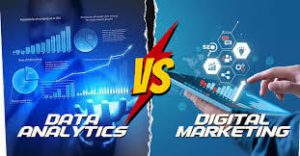Digital Marketing and Data Analytics
Digital marketing and data analytics are two important fields that are closely related, but they are not the same thing. In this blog, we will explore the differences between digital marketing and data analytics and how they complement each other. In today’s rapidly evolving digital landscape, businesses are constantly seeking innovative ways to connect with their target audiences and drive growth. While they serve distinct purposes, their integration can revolutionize how businesses understand and engage with their customers. Let’s delve into the realms of digital marketing and data analytics, exploring their uses, differences, and the synergies they offer.
Digital marketing:

Digital marketing encompasses a broad spectrum of online strategies aimed at promoting products or services. It leverages various digital channels such as websites, social media, email, and search engines to reach potential customers. The primary goal of digital marketing is to increase brand visibility, generate leads, and ultimately drive conversions.
Some common digital marketing techniques include search engine optimization (SEO), content marketing, social media marketing, email marketing, pay-per-click (PPC) advertising, and influencer marketing. Each of these tactics offers unique advantages and requires a tailored approach to maximize effectiveness.
Data Analytics:

On the other hand, data analytics involves the interpretation of vast volumes of data to extract valuable insights and inform strategic decision-making. It encompasses processes such as data collection, cleansing, analysis, and visualization. Data analytics empowers businesses to understand consumer behavior, identify trends, predict outcomes, and optimize performance.
There are various types of data analytics, including descriptive analytics (what happened), diagnostic analytics (why it happened), predictive analytics (what will happen), and prescriptive analytics (how to make it happen). By harnessing the power of data analytics, organizations can make data-driven decisions, enhance operational efficiency, and gain a competitive edge in their respective industries.
Digital Marketing vs. Data Analytics:

While digital marketing and data analytics serve distinct functions, they are interconnected and mutually reinforcing. Digital marketing generates vast amounts of data through user interactions, website visits, social media engagements, email opens, and more. This data serves as the raw material for data analytics, enabling marketers to gain deeper insights into consumer preferences, behaviors, and purchasing patterns.
Digital marketing relies on data analytics to measure the effectiveness of campaigns, track key performance indicators (KPIs), and refine strategies based on actionable insights. Conversely, data analytics relies on digital marketing data to fuel predictive modeling, segmentation analysis, and personalized targeting.
The Synergy:
The true power of digital marketing and data analytics lies in their synergy. By integrating these disciplines, businesses can create highly targeted, personalized marketing campaigns that resonate with their audience on a deeper level. Data-driven insights enable marketers to optimize every stage of the customer journey, from awareness to conversion and beyond.
For example, data analytics can uncover which marketing channels yield the highest return on investment (ROI), allowing businesses to allocate resources more effectively. Moreover, advanced analytics techniques such as machine learning and artificial intelligence (AI) can automate processes, identify hidden patterns, and deliver real-time recommendations for campaign optimization.
Conclusion: Leveraging the Power of Digital Marketing and Data Analytics
In conclusion, both digital marketing and data analytics are indispensable components of a successful business strategy in the digital age. While digital marketing enables businesses to reach and engage with their target audiences across various online channels, data analytics provides the insights needed to optimize marketing efforts and drive informed decision-making.
By the synergies between digital marketing and data analytics, businesses can open new opportunities for growth, customer experiences, and stay ahead of the competition. Whether it’s refining marketing campaigns, improving product offerings, or streamlining operations, the combined power of digital marketing and data analytics is essential for achieving sustainable success in today’s fast-paced business landscape.

